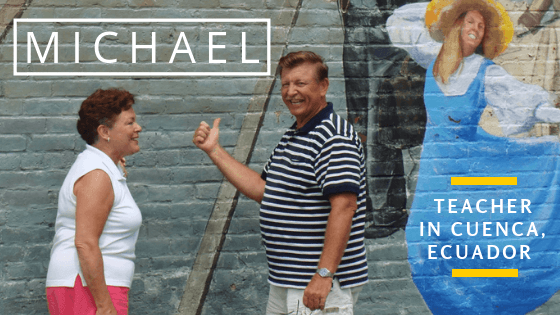Michael is a BridgeTEFL online course graduate who moved to South America after retiring from his teaching career in the U.S., in order to begin a new adventure as an English teacher in Ecuador.
Tell us a bit about yourself, Michael.
I was born in 1948 in Indianapolis, Indiana, where I spent the first 22 years of my life. During my high school years, it became clear to me that my gifts and skills lay in the field of language learning and teaching. I studied Latin, Greek, and Spanish in high school and would help my peers with their language homework. In college, I continued to study ancient Greek, Spanish, and added French and Linguistics to my program. In 1970, a summer in France helped to reinforce my French language skills through a total immersion experience.
My wife and I had met in 1969 during our undergraduate years at Georgetown University in the School of Languages and Linguistics, where we were studying French, Spanish, and Linguistics. After graduation, we were married and moved to Paris, France, where I was completing my Master’s degree in French through Middlebury’s program in conjunction with the Institut des Professeurs de français à l’étranger at the Sorbonne.
Did you have a different career before teaching?
Actually, teaching languages has pretty much always been my career. I taught French and Spanish on the high school level for 29 years. Then, after completing my D.M.L. (Doctor of Modern Languages) degree with Middlebury College (Vermont), I taught French, Spanish, and (sometimes) Latin on the college/university level until retirement in 2015. After that, I taught French part-time on the community college level for a couple of years.
You got certified via the BridgeTEFL Online Master Certificate. How did you choose your TEFL course and did it help you prepare to teach English?
The research that I had done on-line told me that a Master Certificate in TEFL would be useful and widely-honored if I wanted to teach abroad. Thus, I enrolled in that course. The description promised the course content and the materials that I would need and that it would be valid for me to be able to teach in the country of my choice.
The tutor to whom I was assigned (Amy Pascucci) was extremely professional, helpful, attentive, and responsive during the course. Not only did she correct my work, but she also asked questions to further expand my knowledge and suggest strategies that would improve my teaching and help me to relate to different levels of students that I might encounter. Amy was affirming and challenging in our exchanges.
If you’re new to teaching, you’ll want to get initial training and qualification with a TEFL certificate. You can explore our online TEFL courses to get started!
What led you to TEFL in Ecuador?
It was actually in 2014 that I began to think about retirement. I was reluctant to cut myself off from the classroom because I had enjoyed being with students for over 40 years and still believed that I had something to offer to eager learners.
In 2015, I began researching places to retire, and Ecuador, Cuenca in particular, looked very appealing. I had heard of the need for teachers there, and the temperate climate, the pro-American attitude, the use of the American dollar, and the same electrical current and outlets as in the USA are some of the reasons that we chose this country and this city.
How did you find your job in Cuenca? Did you arrange it before you arrived?
I contacted at least 4 different language institutes online, including the Centro de Estudios Interamericanos (CEDEI), before first coming to Ecuador. In 2016 (before the earthquake in April), my wife and I came to Cuenca on a kind of recognizance mission to see if we could live here for a time. While there, I visited 3 of the institutes in person, spoke with the directors and dropped off my CV at each. It was clear after corresponding with the CEDEI director, that this was indeed the language institute best suited to my teaching style.
I have been teaching at the CEDEI since January, 2018. Thus far, it has been a wonderful experience!
Please describe your teaching job at CEDEI.
At the time that I applied for a position at the CEDEI, there were some 50 teachers. The classes were limited to a maximum of 15 students. Prospective students were given an oral interview and a written placement test before being assigned to their appropriate level of study.
My students thus far have ranged in age from 14 to 49 years old! I have taught levels 102 (beginners) through 303 (upper-intermediate). Thanks to the CEDEI’s philosophy of teaching and learning, the maximum number of students is 15 in a class. (This is a far cry from the 30 to 35 students permitted in a language course in the United States!) From the outset, all the students and teachers understand that the program dictates that the courses must be taught IN THE LANGUAGE with a very heavy CULTURAL COMPONENT. I have really valued and loved the face-to-face, spontaneous contact with students who are motivated to learn the language.
What is a typical workday like for you?
Well, since I am semi-retired, I have asked to be scheduled for no more than 2 classes per cycle. Some teachers want to teach a “full load” of 5 classes. The director and assistant director of the CEDEI do their best to match the teachers with those classes they desire and for which they seem best suited. I believe that I am better suited to teach on the high school and college levels.
I prefer classes that are either “back-to-back” or scheduled fairly close together. And, since the CEDEI has 3 locations in the city of Cuenca, I request to teach in El Centro, because it is most convenient to walk to from where we live. Thus far, my requests have been honored.
Who are your colleagues at CEDEI?
The other teachers in the CEDEI are from all over: Zimbabwe, Norway, Nigeria, Canada, the USA, etc. Their English is excellent, their dedication to their students and to the program is exemplary, and their cultural diversity and accents are broadening for their students and their colleagues!
Do you and your wife live in an apartment or a house?
We live in a 2-bedroom / 2-bathroom apartment. It is sparsely furnished, but, since we are retired, it is sufficient for our current needs. We can receive some guests, and it is much less costly than in the United States!
Is it easy to make friends there? What do you do on weekends and school holidays?
Thus far, we have made some expat and Ecuadorian friends. There are groups with whom we meet occasionally. For example, our French-Canadian friends have invited us to join them for a “Thanksgiving” celebration at the Alliance Française in a few days. We have also been invited to a Cuencano family’s home to play cards and share a meal. In short, people are very friendly and hospitable, especially if you show an interest in their language and culture.
We are continuing to learn a great deal about the Ecuadoran culture and the language. Basically, this is our 45th and 46th wedding anniversary adventure, too!
What’s something interesting or fun about Ecuadorian culture or teaching in Ecuador that surprised you?
One of the most important qualities of people in Ecuador is their RESPECT for others. If someone sees that you are in need of help, directions, information, food, etc., it has been our experience that that person will approach you and offer to be of service. If you try to speak to the person in Spanish, it’s even better. Many Ecuadorians want to practice their English with you, as well. Speak English with them!
What recommendation do you have for someone who wants to teach in Ecuador?
If you want to teach English abroad, you will find the Ecuadorians very willing students, especially those who choose to study at the CEDEI. The English program is well-structured and thorough.
From the outset, the students and parents understand that the administrators and teachers are professional, the program is rigorous, and the results are attainable and real. I have told my students, for example: 1) Thank your former teachers who have taught you well (because your ability to communicate is quite acceptable) and 2) Should you decide to go to an English-speaking country to study or to work, you will be able not only to further your knowledge but to flourish in whatever you decide to undertake. They need to know that they have the skills, the confidence, and the passion to make their dreams come true!











